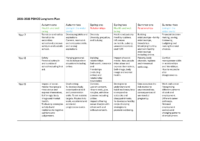Personal, Social, Health and Citizenship Education
Curriculum Intent
The central intent is to provide a structured programme to cover the core themes of health and wellbeing, relationships and citizenship and enable students to develop the knowledge, skills and attributes they need to keep themselves healthy and safe and prepare for life and work in modern Britain.
The curriculum is structured to provide a coherent programme of personal, health, social, citizenship and careers education that provides opportunities for pupils to reflect on and clarify their own values and attitudes and explore a complex and sometimes conflicting range of values and attitudes they may encounter now and in the future.
The PSHCE curriculum aims to help pupils to:
- Identify their personal qualities, attitudes, skills, attributes and achievements and what influences these.
- Explore their attitudes, values and beliefs and develop the skills, language and strategies needed to manage any issues should they encounter them in their lives.
- Apply academic skills such as critical thinking and resilience, to their approach to the study of PSHCE.
- Promote pupils’ spiritual, moral, social and cultural development.
Personal, Social, Health and Citizenship Education (PSHCE) is an important and necessary part of all pupils’ education. The school follows the DFE PSHCE guidance and units of work devised by the PSHCE Association programme of study and Citizenship Education. Students have one timetabled lesson per week which is supplemented by curriculum focus days and special events or workshops throughout the year delivered by outside agencies, for example Deafax or the school nurse.
In PSHCE students acquire the knowledge, understanding and skills they need to manage their lives, now and in the future. PSHCE education develops the qualities and attributes pupils need to thrive as individuals, family members and members of society. Sex and relationship education (SRE) is an important part of PSHCE education and students will have opportunities to learn about developing and maintaining healthy relationships, about consent in a variety of relationships and how to identify and access appropriate advice and support.
Citizenship education equips students with the knowledge, skills and understanding to play an effective role in public life. Heathlands follows the KS3 Programme of study for Citizenship which encourages students to take an interest in topical issues and to engage in discussion and debate. Students learn about their rights, responsibilities, duties and freedoms and about laws, justice and democracy.


